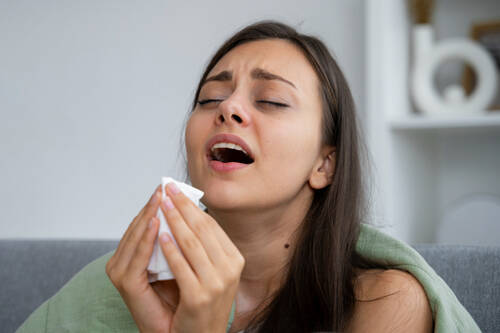
17 Dec Can Allergies Cause Swollen Lymph Nodes? Understanding the Connection
Please consult your health care provider regarding your allergies and in particular any swollen lymph nodes. Swollen lymph nodes may be a sign of a serious illness, including malignancies and therefore should be addressed by your provider. Do not treat swollen lymph nodes with supplements or other products unless approved by your health care provider.
Swollen lymph nodes can be uncomfortable and sometimes worrisome. They’re usually tied to infections, but did you know allergies can also trigger it? Although rare, allergies can sometimes cause lymph nodes to swell, making it important to understand this connection.
The question is: What’s the relationship between allergies and swollen lymph nodes?

Role of Lymph Nodes in the Immune System
Lymph nodes, small bean-shaped glands, sit throughout your body, with noticeable clusters in your neck, armpits, and groin. They trap harmful invaders like bacteria, viruses, and allergens, helping to keep you healthy and acting as the body’s safety net. These connect through lymphatic vessels, working to filter lymph fluid, and this very fluid carries white blood cells, proteins, and other components that strengthen your immunity.
What happens when lymph nodes swell? It’s often a sign that the body is combating an infection or responding to another immune challenge. While infections are the most frequent cause of swelling, allergic reactions can also play a role by triggering the immune system.
Can Allergies Cause Swollen Lymph Nodes?
Allergies can lead to swollen lymph nodes, but it’s not the typical response. Allergic reactions activate the immune system, which releases chemicals like histamine to fight perceived threats. This immune response can result in inflammation, which can involve the lymph nodes.
Seasonal allergies, food allergies, and allergic asthma contribute to lymph node swelling. In many cases, secondary infections caused by a weakened immune system due to allergies are the actual culprits behind the swelling.
Seasonal Allergies and Lymph Node Swelling
If you deal with seasonal allergies or hay fever, you’re probably familiar with the sneezing, runny nose, and itchy eyes that come along with it. These allergies are triggered by the likes of pollen, grass, and other allergens in the air.
But did you know your immune system’s reaction to these allergens can cause inflammation in different parts of your body, including your lymph nodes?
In some cases, this might make your lymph nodes swell, especially if a respiratory infection comes along for the ride.
The good news is that managing seasonal allergies can help keep lymph node swelling at bay. Taking antihistamines or steering clear of triggers are great ways to keep symptoms under control.
Don’t forget the basics, though: drink plenty of water and make sure you’re getting enough rest. Your immune system needs that extra support during allergy season.
Allergic Asthma and Lymph Nodes
Allergic asthma is a condition where allergens cause inflammation in the airways. If not treated, it can result in wheezing, coughing, and other respiratory symptoms. You can lower the risk of infections and swollen lymph nodes by treating allergic asthma with prescribed medications and limiting your exposure to triggers.
Food Allergies and Immune Reactions
When a person with a food allergy consumes a triggering substance, the body’s immune response releases chemicals to counteract the allergen. This process may lead to inflammation throughout the body, including the lymph nodes.
Not to mention, allergies weaken immunity, making you more prone to infections, further increasing your risk of lymph node swelling.
Avoiding allergenic foods and working with healthcare providers to identify triggers through testing are effective steps in managing food allergies. Keeping the immune system strong through balanced nutrition and hydration can further help mitigate the risks.
For swelling that is accompanied by symptoms like fever, redness, or night sweats, it’s essential to seek medical advice. A healthcare provider may perform diagnostic tests to rule out more serious underlying conditions.
Other signs to watch out for, indicating you should see a provider promptly:
- Hard or lumpy lymph nodes,
- Severe pain,
- Weight loss,
- Difficulty swallowing,
- Night sweats.
Supporting Your Immune System During Allergy Season
To minimize the risk of swollen lymph nodes and other complications, it’s important to maintain overall health during allergy season. Lymph support supplements, alongside a healthy diet, regular exercise, and adequate sleep, augment immunity an may reduce our susceptibility to infections.
Please note: Supplements are generally not FDA tested or approved. Some supplements can interfere with medications and/or cause side effects. Do not delay seeking medical attention for medical concerns by taking supplements without medical advice.
Please discuss any and all supplements you take with your health care provider and be sure to follow your provider’s recommendations for your prostate and overall health.
Takeaway
Although allergies are not a common cause of swollen lymph nodes, they can sometimes contribute to this condition through inflammation or secondary infections. Taking steps to support your immune system can make a big difference in reducing discomfort.
Staying proactive about your health and knowing when to seek medical advice can help you manage symptoms and keep your well-being on track.
More information:
- https://www.beckerentandallergy.com/blog/allergies-cause-swollen-lymph-nodes
- https://pmc.ncbi.nlm.nih.gov/articles/PMC9710411/
The information on MedicalResearch.com is provided for educational purposes only, and is in no way intended to diagnose, cure, or treat any medical or other condition.
Some links are sponsored. Products, images and services are not endorsed.
Always seek the advice of your physician or other qualified health and ask your doctor any questions you may have regarding a medical condition. In addition to all other limitations and disclaimers in this agreement, service provider and its third party providers disclaim any liability or loss in connection with the content provided on this website.
Last Updated on December 17, 2024 by Marie Benz MD FAAD
